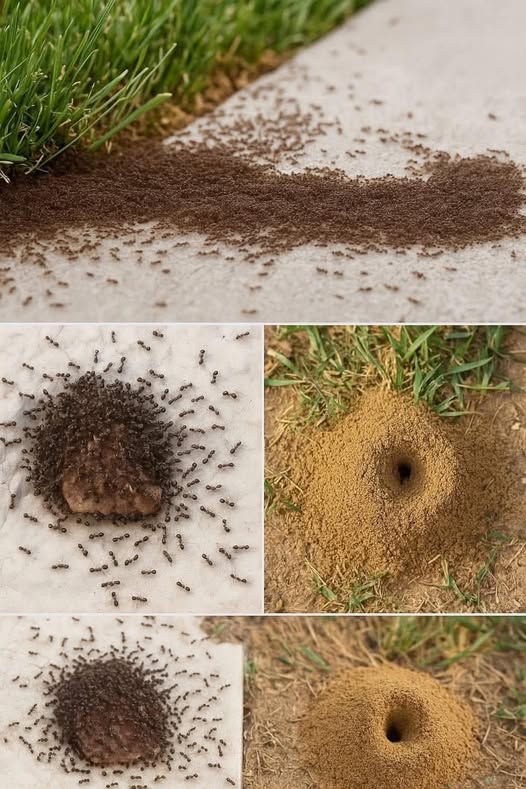How to Get Rid of Ants in Your Garden Naturally – With Just 20 Cents
Eco-Friendly, Homemade Ant Killer That Really Works
If ants are taking over your garden, don’t rush to use chemical-laden pesticides that can harm your plants, pets, and the environment. There’s a simple, effective, and incredibly cheap natural solution you can make at home — and it costs less than 20 cents.
This eco-friendly recipe uses common household items to create a powerful natural ant bait that’s safe for your garden but lethal to ants. With just hard-boiled egg yolks, honey, and boric acid powder, you can eliminate ant colonies without risking your soil, plants, or health.
🌿 Ingredients for Homemade Ant Killer
This natural paste acts as a bait that ants take back to their colony. Once consumed, it leads to dehydration and colony collapse — without spraying any toxins in your garden.
What You’ll Need:
- 2 hard-boiled egg yolks
- ½ teaspoon honey
- 1 teaspoon boric acid powder (available at pharmacies or online)
💡 Boric acid is a natural mineral compound. When used in small amounts, it’s safe for humans and pets but deadly to ants.
🥄 Step-by-Step Preparation
1. Mash the Yolks
Peel and remove the yolks from two hard-boiled eggs and mash them thoroughly in a small bowl.
2. Add Honey
Add ½ teaspoon of honey to the mashed yolks. This sweet ingredient helps to attract ants with its scent and taste.
3. Add Boric Acid Powder
Mix in 1 teaspoon of boric acid powder. Blend the ingredients until you form a thick, smooth paste.
🪤 How to Apply It in the Garden
Now that you have your ant bait, it’s time to apply it strategically around the garden:
- Place small pea-sized portions of the paste on leaves, near anthills, cracks, or along ant trails.
- Use plastic bottle caps or small lids to contain the paste and keep it from touching soil or plant roots directly.
- Keep the bait dry and replace it every 2–3 days to maintain effectiveness.
- Watch the ants carry the paste back to their nests, where the boric acid does its work quietly and efficiently.
⚠️ Important: Keep the bait out of reach of pets or children, and label it clearly if storing for later use.
🌱 Why This Works: Natural Science Behind the Recipe
- Egg yolks provide a base and attract ants with their scent and fat content.
- Honey acts as a sugar lure, drawing ants quickly to the bait.
- Boric acid is a slow-acting poison that ants ingest and share with the colony, ensuring maximum effectiveness without alerting the swarm.
The goal is not to kill ants instantly but to let them bring the bait back to their nest, so it reaches the queen and the colony.
🌿 Other Natural Ant Repellents to Try
Want to reinforce your garden’s defenses? Use these additional natural ingredients around your garden borders or near visible anthills:
1. Bay Leaves
- Place dried bay leaves around plants and in garden beds. Ants hate the smell and avoid it naturally.
2. Cinnamon and Black Pepper
- Sprinkle cinnamon powder or black pepper along windows, cracks, garden beds, or wherever you see ant traffic.
- These spices irritate ants’ senses and disrupt their scent trails.
3. Baking Soda and Sugar
- Mix equal parts baking soda and powdered sugar, then place in shallow containers. Ants are attracted to the sugar and unknowingly consume the baking soda, which is lethal to them.
4. Mint, Cornstarch, and Talc
- Crushed peppermint leaves or peppermint oil act as natural repellents.
- Cornstarch or talcum powder sprinkled near trails can dehydrate ants or block their movement.
🛑 What to Avoid When Fighting Ants Naturally
While these natural remedies are effective, using them improperly can reduce results or even worsen infestations.
- Don’t use boric acid directly on plants. It’s a mineral but still toxic in high concentrations.
- Avoid combining multiple strong repellents in one area. It can confuse the ants and cause them to spread rather than concentrate at bait stations.
- Don’t disrupt ant trails while the bait is still working — allow them to take it back to the colony.
🏡 Benefits of Using Natural Ant Control
Using natural ant deterrents and homemade baits offers several long-term advantages:
- Safe for plants and soil
- Non-toxic to beneficial insects like bees and butterflies (when used correctly)
- Affordable and accessible
- Eco-conscious — avoids synthetic pesticides
- Effective long-term control without recurring infestations
👨🌾 How to Prevent Future Ant Invasions
Once your current infestation is handled, keep ants from returning with these easy tips:
- Seal cracks and entry points around your home or greenhouse.
- Remove standing water and excessive mulch — ants love damp environments.
- Keep compost bins and garbage tightly sealed.
- Use essential oils like peppermint or eucalyptus to create barriers around plants or patios.
- Keep food areas clean — no crumbs, sugars, or open produce should be left in the open.
Conclusion: Natural Control, Real Results
Dealing with ants in your garden doesn’t require harsh chemicals or costly exterminators. With just two boiled egg yolks, a little honey, and boric acid, you can craft an eco-friendly ant bait that’s effective, safe, and shockingly cheap.
Combine this bait with natural repellents like bay leaves, cinnamon, or mint, and you’ll have a garden that’s free of ants — and full of life.
So next time you spot an ant line winding through your vegetables or flowers, don’t panic. Just reach into your pantry and fight back naturally.
